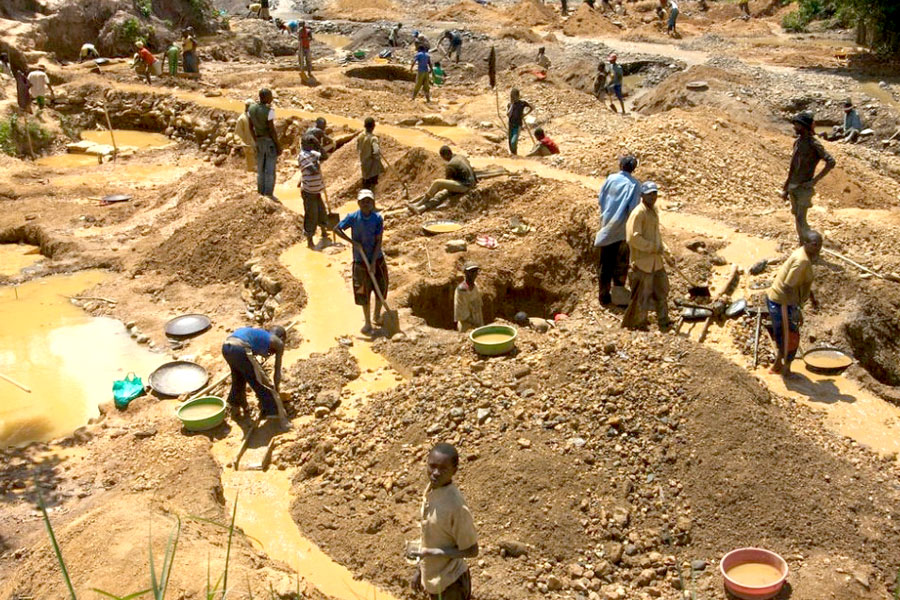
Commentaries | Feb 20,2021
Apr 11 , 2020.
On Friday, Ethiopia's legislators passed a decree on state of emergency, the fourth in four years. Considering how scared the public gets of the potential spread of a deadly virus, there was no resistance, but an MP abstained. Imposed for five months, the state of emergency is a choiceless choice. Neither will it most likely be the last.
In September, a month before the five-year term of the current parliament comes to an end, legislators will have to vote on a bill on what to do with the state of governance in the absence of an elected political party - or a coalition thereof - that wins national elections to earn the mandate to govern.
The crisis of legitimacy to rule has been what ails Ethiopia's politics for generations. Political instability rages, conflicts break out, millions get displaced, and lives are lost. As recently as two years ago, Ethiopia had been on the brink of collapse.
In the eyes of the public, successive decrees of the state of emergency up until 2018 were measures that had been used, misused and abused. Over the past two years, the new administration under Prime Minister Abiy Ahmed (PhD) considered such a decree an act reminiscent of a time it labelled "dark" and resisted the temptation. Most on the side of the opposition were no less welcoming, much like international human rights advocates, who saw emergency declarations tantamount to rolling back political rights.
The Novel Coronavirus (COVID-19) pandemic has given an administration set on avoiding an impression of political repression a justification for declaring a national emergency. It was expected, not least, because various other countries hit by the pandemic, including Uganda and Rwanda, have already done it. In Ethiopia, the Tigray Regional State had taken the unprecedented step and invoked the regional government’s emergency powers in its fight against the spread of the virus.
More than precedence from other governments inside and outside the country, the increasing seriousness of the pandemic has made it evident that the administration has limited options. As the number of positive cases and affected individuals with no travel history increases, including in the regional states, there is growing apprehension that Ethiopia is inching further to a third stage in the outbreak: community transmission.
How far behind Ethiopia is in testing can serve as an indication of the likely exponential growth in the number of cases in the coming weeks, if not months. Ethiopia had only tested 28 people for every one million by April 10, 2020, compared to Kenya’s 98, Uganda’s 72 and Djibouti’s 3,785.
Considering the circumstances, the administration had little else as an option but to tap into its emergency powers to contain the spread of the virus through physical distancing - not social - measures. Failure to take aggressive and proactive actions would be tantamount to putting "a dollar figure on human life."
Nonetheless, the “cure” to the pandemic, as in the economy, will have dire consequences in the political sphere. For a country looking forward to an election for two years, in a political space relatively more inclusive and encompassing of a politically active citizenry, the pandemic could not have come at a worse time.
In cancelling her electoral calendar, Birtukan Mideksa's actions were representative of how much the pandemic was to complicate the coming national elections and possibly plunge the country into a constitutional crisis. Her decision was predicated on the impossibility of carrying out electoral business in March and April.
Chief among Birtukan and company's concerns was that voter registration materials were stuck at a Ethiopian Airlines' warehouse and that procurement of printed materials is behind schedule. The National Election Board will also be unable to begin the roll out of 150,000 voter registration staffers across the country and conduct public outreach campaigns including voter education.
Birtukan had been adamant in expressing that it would be operationally impossible to start polling by the end of August. In suggesting that all she could do at this point is offer recommendations, she has put the ball in the administration’s, hence parliamentarians', court.
Short of any precedent or constitutional provision outlining the way forward, the elections will remain suspended in the air. On the edge of a crisis that can lead to political instability as the incumbent loses its mandate to rule, Abiy’s administration faces its most significant test yet.
It should not be all doom and gloom though. No doubt, the months ahead will be straining and painful. But uncharted waters such as this offer the opportunity to breathe an air of trust and goodwill back into a transitional political process that has since lost a good deal of legitimacy. It requires careful and delicate handling and management.
The huge cleavages between the various organised groups in the country have given way to conflicts and violence, making a smooth path out of the crisis a near impossible task. For many, politics is a zero-sum game. The art of the impossible.
With sufficient will and compromise, this does not have to be the case.
Credit is where it is due. There have been gestures by Prime Minister Abiy in bringing many of the political opposition on board to take part in the discussions on the way forward. A day before the Council of Ministers would declare the state of emergency, Abiy sat down with several leaders of opposition parties to discuss the possible measures for mitigation of the spread of the virus.
It is a gesture that should be appreciated in as much as it should be extended further as the country navigates its way out of a potential constitutional crisis. The main obstacle remains that the framers of Ethiopia's current Constitution overlooked a crucial provision in the Constitution on what would follow in the case it would be impossible to hold national elections upon schedule.
Fortunate for the incumbent Prosperity Party, leaders of major opposition parties seem to be on the same page when it comes to a recommendation by the Electoral Board not to stick to the timetable. This is a piece of goodwill among several of the opposition groups that can be built on to include them in future dialogue in the effort to chart a way forward.
The objective of this dialogue can be to agree on whether or not the elections should be postponed, and if it does, how to go about it. More importantly, such a dialogue should be held to define and agree on the modalities of governance once the incumbent's term expires. Allowing this will no doubt have questionable ramifications on the Prime Minister and his cabinet's legal standing to govern.
Prime Minister Abiy has the option of dissolving parliament a month before the term expires, of course with the consent of the majority in parliament. But that will only buy him time for six months, within which he has to let elections take place. Considering the statement from Birtukan's Board that implies elections may be held a year from now, this appears to be the most likely option, strong in the minds of those in charge of the incumbent party.
There is also another option despite the high stakes on the political game board.
An important consideration can be given to the road less travelled over the past 20 years, since the adoption of the current Constitution in 1995. The Prime Minister can push for the introduction of a constitutional amendment to change the provision that limits extensions of national elections beyond five years despite national emergencies. He can mobilise a two-thirds majority in both chambers of the legislature to initiate such an amendment and persuade councillors in six of the nine regional states to ratify it.
This is doable and does not require explicit consent from all the regional states as Chapter Two of the Constitution does. But more importantly, the dialogue and debate such a move will evoke across the political spectrum can serve as a platform for healthy and constructive debate and dialogue among many parties interested in constitutionalism and the constitutional order.
PUBLISHED ON
Apr 11,2020 [ VOL
21 , NO
1041]

Commentaries | Feb 20,2021

Viewpoints | Jun 03,2023

Verbatim | Jul 13,2019

Editorial | Nov 04,2023

Fortune News | May 13,2023

Editorial | Apr 22,2023

Radar | Jun 17,2023

Viewpoints | Jul 03,2021

Viewpoints | Aug 01,2020

View From Arada | Aug 13,2022

Photo Gallery | 178468 Views | May 06,2019

Photo Gallery | 168667 Views | Apr 26,2019

Photo Gallery | 159472 Views | Oct 06,2021

My Opinion | 137078 Views | Aug 14,2021

Dec 22 , 2024 . By TIZITA SHEWAFERAW
Charged with transforming colossal state-owned enterprises into modern and competitiv...

Aug 18 , 2024 . By AKSAH ITALO
Although predictable Yonas Zerihun's job in the ride-hailing service is not immune to...

Jul 28 , 2024 . By TIZITA SHEWAFERAW
Unhabitual, perhaps too many, Samuel Gebreyohannes, 38, used to occasionally enjoy a couple of beers at breakfast. However, he recently swit...

Jul 13 , 2024 . By AKSAH ITALO
Investors who rely on tractors, trucks, and field vehicles for commuting, transporting commodities, and f...

Oct 25 , 2025 . By YITBAREK GETACHEW
Officials of the Addis Abeba's Education Bureau have embarked on an ambitious experim...

Oct 26 , 2025 . By YITBAREK GETACHEW
The federal government is making a landmark shift in its investment incentive regime...

Oct 29 , 2025 . By NAHOM AYELE
The National Bank of Ethiopia (NBE) is preparing to issue a directive that will funda...

Oct 26 , 2025 . By SURAFEL MULUGETA
A community of booksellers shadowing the Ethiopian National Theatre has been jolted b...